Understanding The Difference Between CBD and THC
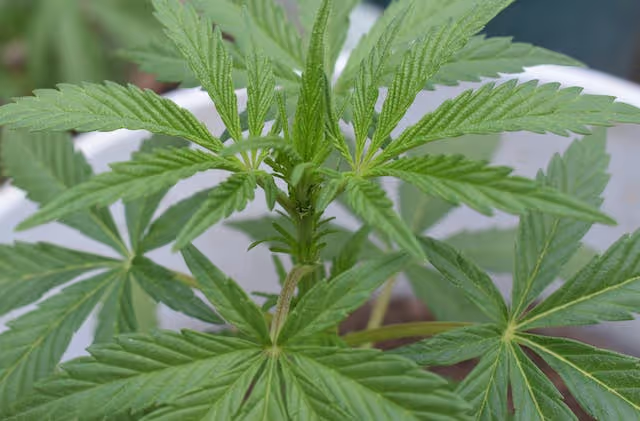
CBD and THC: An Introduction
To understand the difference between CBD and THC, it's essential to have a clear understanding of what each of these compounds is and how they differ from one another.
What is CBD?
CBD, short for cannabidiol, is one of the many cannabinoids found in the cannabis plant. Unlike its counterpart THC, CBD is non-intoxicating, meaning it does not produce a "high" effect. CBD is typically derived from hemp, a variety of cannabis with low THC content.
What is THC?
THC, short for tetrahydrocannabinol, is another prominent cannabinoid found in the cannabis plant. Unlike CBD, THC is psychoactive and can produce mind-altering effects. It is the main compound responsible for the intoxicating effects commonly associated with marijuana use.
Key Differences Between CBD and THC
CBD and THC differ in several key aspects, including their chemical composition, effects on the body and mind, legality, and therapeutic uses.
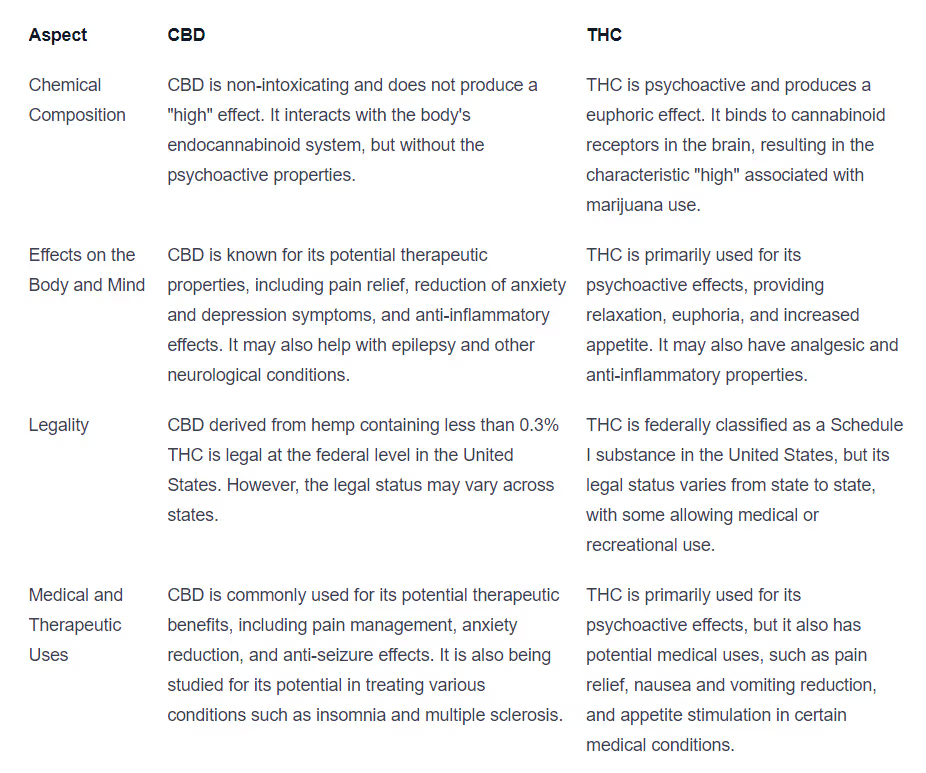
Understanding the differences between CBD and THC is crucial for individuals looking to explore the potential benefits of cannabis-derived products. While CBD offers non-intoxicating therapeutic effects, THC provides psychoactive properties that may be sought after recreationally or for specific medical purposes. It's important to consider these distinctions when choosing products and understanding their potential effects.
Chemical Composition and Effects
To truly understand the differences between CBD and THC, it's important to delve into their chemical composition and the effects they have on the body and mind.
Understanding Cannabinoids
Both CBD (cannabidiol) and THC (tetrahydrocannabinol) are cannabinoids, which are naturally occurring compounds found in the cannabis plant. These cannabinoids interact with the body's endocannabinoid system, a complex network of receptors that regulates various physiological processes.
While CBD and THC share the same chemical formula (21 carbon atoms, 30 hydrogen atoms, and 2 oxygen atoms), they have different arrangements, leading to distinct effects on the body and mind.
Different Effects on the Body and Mind
One of the key differences between CBD and THC lies in the psychoactive properties of THC. THC is the compound responsible for the "high" commonly associated with marijuana use. When THC binds to cannabinoid receptors in the brain, it activates them and produces psychoactive effects.
On the other hand, CBD does not produce a psychoactive effect. It does not bind strongly to the cannabinoid receptors in the brain, and as a result, it does not induce the same intoxicating effects as THC.
Moreover, CBD has been found to modulate the effects of THC. It can counteract some of the psychoactive properties of THC, helping to reduce anxiety or paranoia that can sometimes be associated with THC usage.
The effects of CBD and THC extend beyond their psychoactive properties. Both cannabinoids have shown potential therapeutic benefits, although their mechanisms of action and applications vary. CBD is known for its potential anti-inflammatory, analgesic, and anxiolytic properties, while THC has been primarily associated with pain relief, appetite stimulation, and relaxation.
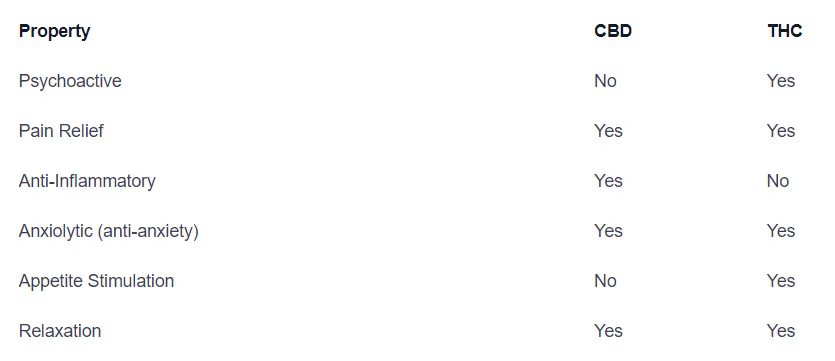
Understanding the chemical composition and effects of CBD and THC is essential in determining how each cannabinoid may impact the body and mind. It's important to consider these differences when exploring the potential benefits and uses of CBD and THC in various medical and therapeutic applications.
Legality and Regulations
Understanding the legal status of CBD and THC is essential as it can vary across different jurisdictions. Let's explore the legal status of CBD and THC, as well as the variations that exist.
Legal Status of CBD
CBD, also known as cannabidiol, has gained popularity for its potential therapeutic benefits. The legal status of CBD largely depends on its source and the level of THC present in the product. In the United States, CBD derived from hemp, which contains less than 0.3% THC, was federally legalized with the passage of the 2018 Farm Bill. This legalization allows for the production and sale of hemp-derived CBD products in most states.
However, it's important to note that individual states may have their own regulations regarding the sale and use of CBD. Some states have embraced CBD more liberally, while others have placed restrictions or imposed additional requirements. It's crucial to research and understand the specific laws in your jurisdiction before purchasing or using CBD products.
Legal Status of THC
THC, or delta-9-tetrahydrocannabinol, is the psychoactive component of cannabis that produces the "high" commonly associated with marijuana. The legal status of THC varies significantly from country to country and even within different states or provinces.
In some regions, THC is strictly regulated and considered illegal for recreational use. However, an increasing number of jurisdictions have begun to decriminalize or legalize the recreational use of marijuana, allowing for the consumption and possession of THC-containing products. Medicinal use of THC is also permitted in many places under specific conditions.
It's crucial to familiarize yourself with the laws and regulations surrounding THC in your specific area to avoid any legal consequences.
Variations Across Jurisdictions
The legal status of CBD and THC can differ not only between countries but also within different states or provinces. While some regions have embraced the legalization or decriminalization of both CBD and THC, others maintain stricter regulations.
To illustrate the variations across jurisdictions, here is an overview of the legal status of CBD and THC in selected countries:
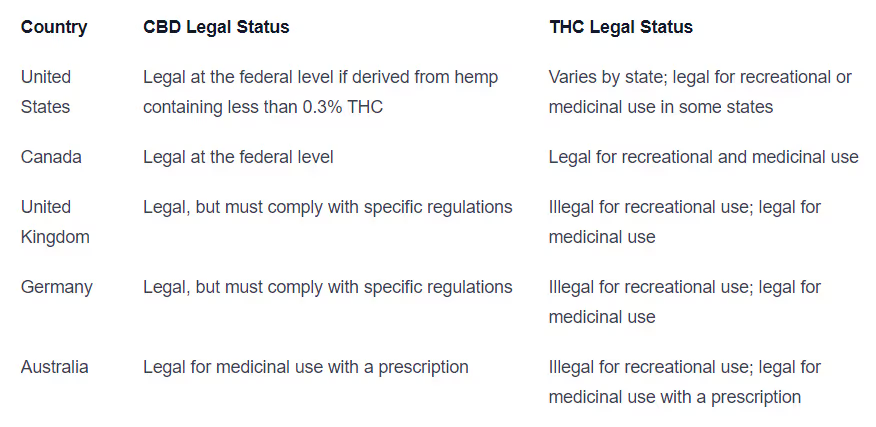
It's important to note that the legal status of CBD and THC is subject to change as regulations are reviewed and updated. Therefore, staying informed about the laws in your specific jurisdiction is crucial to ensure compliance and avoid any legal issues.
By understanding the legal status and regulations surrounding CBD and THC, individuals can make informed decisions regarding their use and ensure compliance with local laws. Remember to consult the specific laws in your jurisdiction and, when in doubt, seek legal advice or guidance from relevant authorities.
Medical and Therapeutic Uses
CBD and THC have gained significant attention for their potential medical and therapeutic benefits. While they both interact with the body's endocannabinoid system, their effects and applications differ. In this section, we will explore the medical benefits associated with CBD and THC, as well as the conditions and symptoms they may address.
Medical Benefits of CBD
CBD has been widely studied for its potential therapeutic effects. It is commonly used to alleviate symptoms associated with various conditions, including:
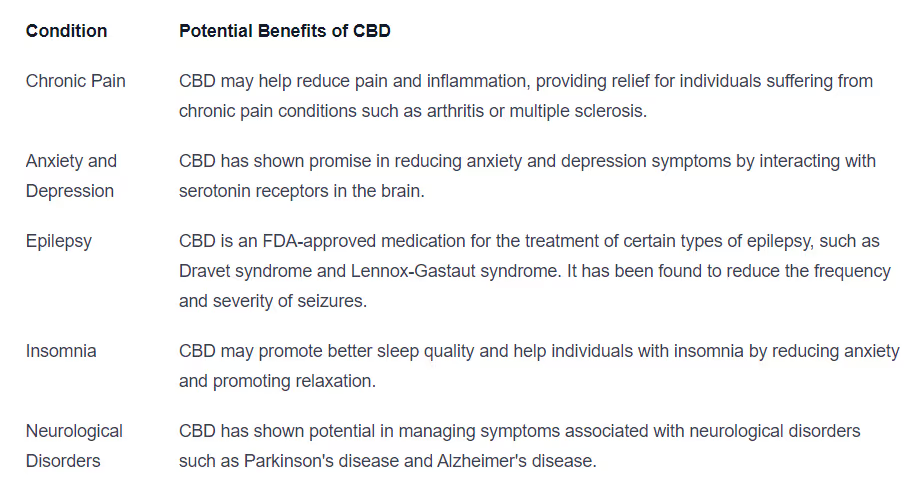
It's important to note that while CBD may provide relief for these conditions, further research is needed to fully understand its efficacy and potential side effects.
Medical Benefits of THC
THC, known for its psychoactive effects, also offers medical benefits. Some of the potential therapeutic uses of THC include:
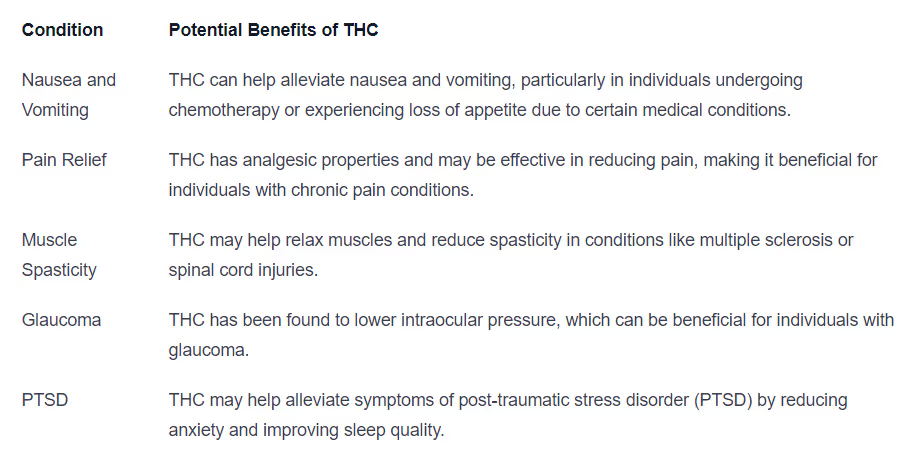
Similar to CBD, more research is needed to fully understand the therapeutic potential of THC and its long-term effects on individuals.
Conditions and Symptoms Addressed
CBD and THC can address a wide range of conditions and symptoms. Here are some examples:
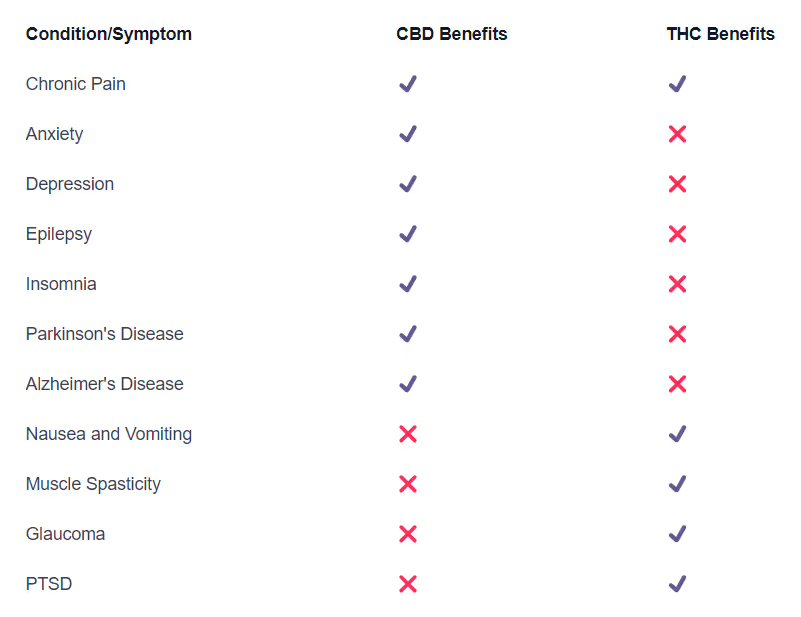
It is important to consult with a healthcare professional before using CBD or THC for medical purposes. They can provide personalized guidance and recommendations based on individual circumstances and medical history.
Understanding the potential medical benefits of CBD and THC can help individuals make informed decisions about their healthcare and explore alternative treatment options.
Side Effects and Safety Considerations
When considering the use of CBD and THC, it's important to be aware of potential side effects and take necessary safety precautions. While both compounds are generally well-tolerated by individuals, they may have some specific effects to keep in mind.
Potential Side Effects of CBD
CBD is generally considered to have a favorable safety profile, with minimal side effects reported. However, some individuals may experience the following potential side effects:
Potential Side Effects of CBD
Dry mouth
Fatigue
Diarrhea
Changes in appetite
Drowsiness
Interaction with certain medications
It's worth noting that these side effects are typically mild and temporary. If you experience any adverse effects, it's advisable to consult with a healthcare professional.
Potential Side Effects of THC
THC, being the psychoactive compound in cannabis, may have more noticeable side effects compared to CBD. These potential side effects can include:
Potential Side Effects of THC
Euphoria
Impaired memory and cognitive function
Red eyes
Dry mouth
Increased heart rate
Anxiety or paranoia
Coordination problems
The intensity and duration of these side effects can vary depending on the individual and the dosage consumed. It's worth noting that THC may have a greater likelihood of causing psychoactive effects.
Safety Precautions to Keep in Mind
To ensure safe and responsible use of CBD and THC, it is important to consider the following safety precautions:
- Start with a low dosage: If you are new to CBD or THC, it's recommended to start with a low dosage and gradually increase it as needed. This allows you to assess your individual tolerance and minimize the risk of adverse effects.
- Consult with a healthcare professional: If you have any underlying medical conditions or are taking medications, it's important to consult with a healthcare professional before incorporating CBD or THC into your routine. They can provide personalized advice based on your specific circumstances.
- Be aware of drug interactions: CBD and THC can interact with certain medications, including those metabolized by the liver. It's essential to inform your healthcare provider about any CBD or THC use to avoid potential interactions that could affect the effectiveness or safety of your medications.
- Purchase from reputable sources: To ensure the quality and safety of CBD and THC products, it's advisable to purchase from reputable sources. Look for products that have undergone third-party testing to verify their potency and purity.
- Follow local regulations: It is important to keep in mind that the legality and regulations surrounding CBD and THC vary across jurisdictions. Familiarize yourself with the laws in your area to ensure compliance and avoid any legal issues.
By being aware of potential side effects and taking appropriate safety precautions, individuals can make informed decisions regarding the use of CBD and THC. Remember, if you have any concerns or questions, it is always best to consult with a healthcare professional for personalized guidance.
Conclusion
As the popularity of CBD and THC continues to grow, it's crucial to understand their differences, potential benefits, and legal status. Both compounds have shown promise in various therapeutic applications, although further research is needed to fully understand their efficacy and long-term effects. By being aware of potential side effects and taking appropriate safety precautions, individuals can make informed decisions regarding the use of CBD and THC.
It's essential to consult with a healthcare professional before incorporating these compounds into your routine, particularly if you have any underlying medical conditions or are taking medications. With careful consideration and responsible use, CBD and THC may offer alternative treatment options for a wide range of conditions.
